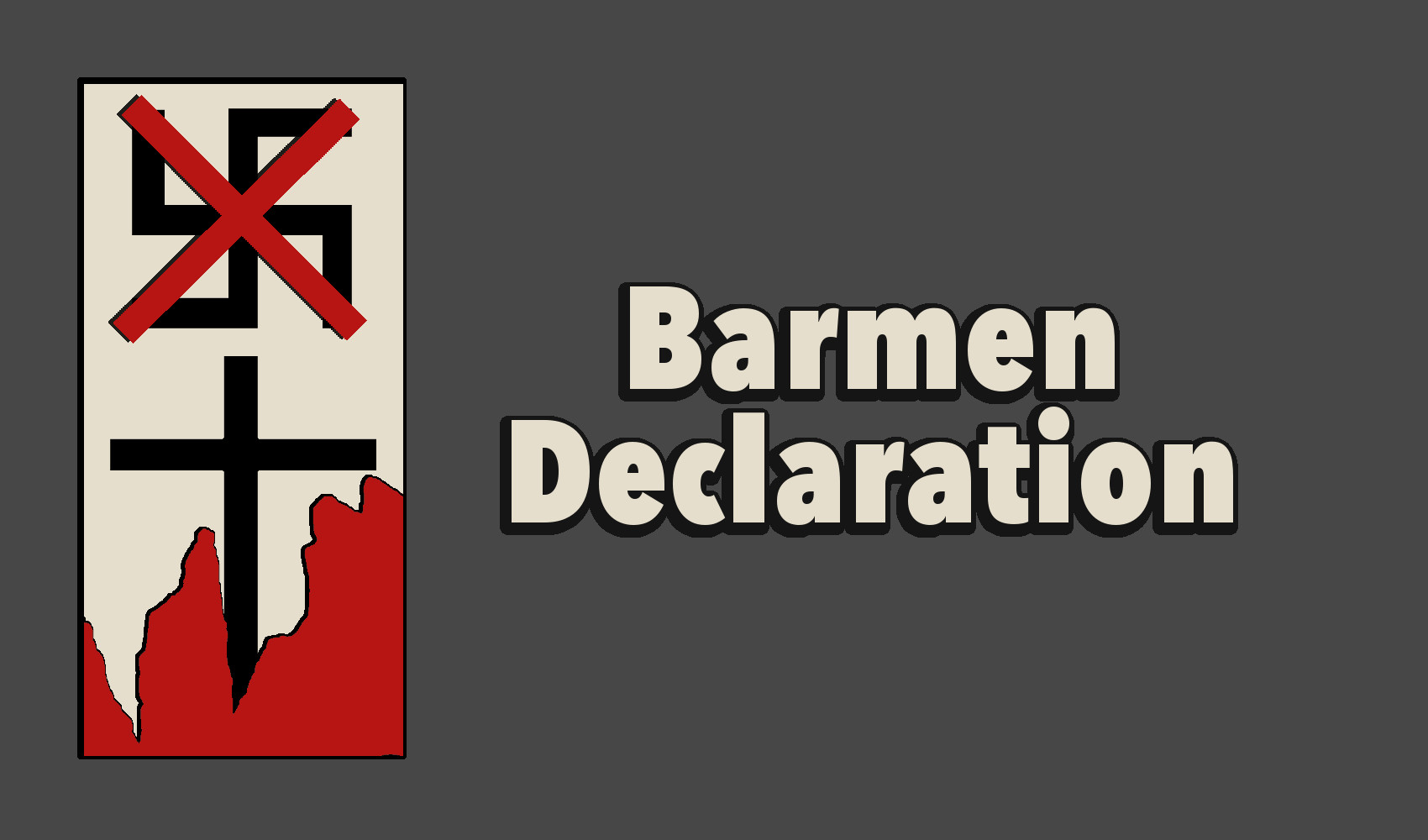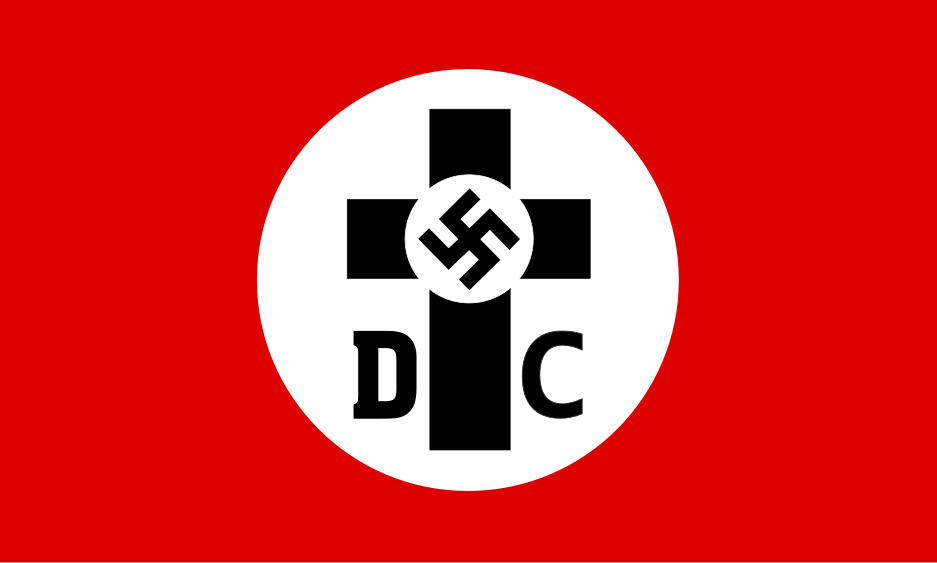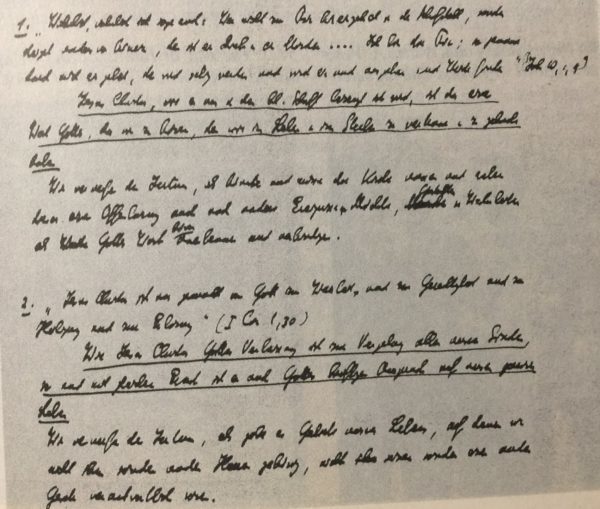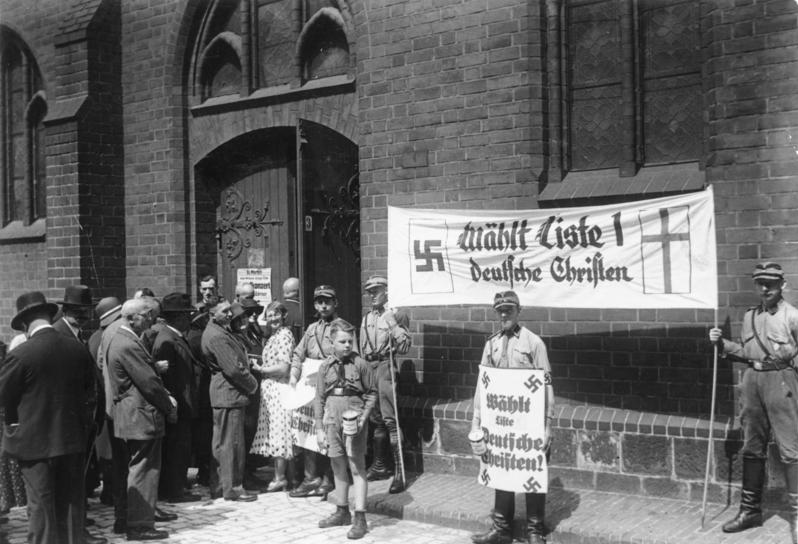
The Present Situation in Nazi Germany

Flag of the "German Christians" during Nazi Germany [1]
The nazification of the German Evangelical Church confederation was not applauded by everyone, and the Confessing Church emerged to protest its capitulating to the German Christians and their Nazi agenda. A Confessional Synod of the German Evangelical Church met in Barmen, May 29–31, 1934 that included representatives from its Reformed, Lutheran and United churches, and their intend was to make an official statement in opposition to the German Christian's nazification of the German Evangelical Church.
Karl Barth and the Barmen Declaration

Karl Barth's first draft of the Barmen Declaration [2]

Stormtroopers holding German Christian propaganda during the Church Council elections on July 23, 1933 at St. Mary's Church, Berlin [3]
It is arguably for the best that Karl Barth's name is not listed in the Barmen Declaration, because it is a confessional document, and it is essentially that this is the joint declaration of the church, not one person alone. However the message of the Barment declaration is one and the same as Karl Barth's theology, and this bold statement was unmatched after 1933 in Nazi Germany. After reading the final text of the Barmen Declaration he said "At the time I was sitting next to Wilhelm Niesel. When it was read, he nudged me and said, 'What a delight for Calvin in heaven!'" [7]
A short video of Karl Barth commenting on the Confessing Church:
The contents of the Barmen Declaration
The Barmen Declaration is available online, and if I receive permission then I will share the full text here in the future. The Barmen Declaration is typically numbered into 28 statements divided into three sections. The first section (#1-4) and second section (#5-9) describe the present situation I already discussed, and they also explain that their intension is to call the church back to its confession of Jesus Christ and it is not its intent to cause schism or divide the church. In the last section (#10-28) contains Karl Barth's six theses that represents the core message of the Barmen Declaration. Each thesis begins with a bible verse, and contains a statement that "we reject the false doctrine" discussed in the respective thesis.
Thesis §1
(John 10:1,9) "Jesus Christ, as he is attested for us in Holy Scripture, is the one Word of God which we have to hear and which we have to trust and obey in life and in death.
We reject the false doctrine, as though the church could and would have to acknowledge as a source of its proclamation, apart from and besides this one Word of God, still other events and powers, figures and truths, as God’s revelation."
Thesis §2
(1 Cor 1:30) "As Jesus Christ is God’s assurance of the forgiveness of all our sins, so in the same way and with the same seriousness is he also God’s mighty claim upon our whole life. Through him befalls us a joyful deliverance from the godless fetters of this world for a free, grateful service to his creatures.
We reject the false doctrine, as though there were areas of our life in which we would not belong to Jesus Christ, but to other lords—areas in which we would not need justification and sanctification through him."
Thesis §3
(Eph 4:15-16) "The Christian Church is the congregation of the brethren in which Jesus Christ acts presently as the Lord in Word and Sacrament through the Holy Spirit. As the church of pardoned sinners, it has to testify in the midst of a sinful world, with its faith as with its obedience, with its message as with its order, that it is solely his property, and that it lives and wants to live solely from his comfort and from his direction in the expectation of his appearance.
We reject the false doctrine, as though the church were permitted to abandon the form of its message and order to its own pleasure or to changes in prevailing ideological and political convictions."
Thesis §4
(Matt 20:25-26) "The various offices in the church do not establish a dominion of some over the others; on the contrary, they are for the exercise of the ministry entrusted to and enjoined upon the whole congregation.
We reject the false doctrine, as though the church, apart from this ministry, could and were permitted to give to itself, or allow to be given to it, special leaders vested with ruling powers."
Thesis §5
(1 Peter 2:17) "Scripture tells us that, in the as yet unredeemed world in which the church also exists, the State has by divine appointment the task of providing for justice and peace. [It fulfills this task] by means of the threat and exercise of force, according to the measure of human judgment and human ability. The church acknowledges the benefit of this divine appointment in gratitude and reverence before him. It calls to mind the Kingdom of God, God’s commandment and righteousness, and thereby the responsibility both of rulers and of the ruled. It trusts and obeys the power of the Word by which God upholds all things.
We reject the false doctrine, as though the State, over and beyond its special commission, should and could become the single and totalitarian order of human life, thus fulfilling the church’s vocation as well.
We reject the false doctrine, as though the church, over and beyond its special commission, should and could appropriate the characteristics, the tasks, and the dignity of the State, thus itself becoming an organ of the State."
Thesis §6
(Matt 28:20; 2 Tim 2:9) "The church’s commission, upon which its freedom is founded, consists in delivering the message of the free grace of God to all people in Christ’s stead, and therefore in the ministry of his own Word and work through sermon and Sacrament.
We reject the false doctrine, as though the church in human arrogance could place the Word and work of the Lord in the service of any arbitrarily chosen desires, purposes, and plans. [8]
Barmen Today

A stamp celebrating the Barmen Declaration's 50 year anniversary [9]
Today, the Theological Declaration of Barmen (as it is commonly titled) has been adopted by many churches, including the Presbyterian Church (PCUSA), the United Church of Christ, the Moravian Church in North America, and many others. The PCUSA (my home church) also created a banner for the Barmen Declaration (as depicted in the header image).
Barmen's Warning
In hindsight, we see the horrors of Nazi Germany here and now, but during the present situation of 1933, the Christians there and then didn't understand that their nationalism would result in the nazification of the church. Every time I see an American flag in a church, I remember this present situation of 1933, and horrors that resulted from them. So I recommend heeding the warning of Barmen, so that the church in my homeland or yours, does not repeat the same disastrous error of capitulating the Church's proclamation of the gospel to agenda of Christian Nationalism like the Nazi "German Christians". We are in constant need to re-affirm the Barmen Declaration, and I am thankful every time I see instances of it such the recent statement "In Defense of a Christian Faith and a Democratic Future" by the faculty at Princeton.
Sources:
1. Source: wikipedia by RsVe - http://de.wikipedia.org/wiki/Datei:Bundesarchiv_Bild_102-15234,_Berlin,_Luthertag.jpg, CC BY-SA 3.0, https://commons.wikimedia.org/w/index.php?curid=11711814
2. Busch, Eberhard. Karl Barth: His Life from Letters and Autobiographical Texts. W.B. Eerdmans Pub. Co., 1994. Print. p. 239.
3. source: wikipedia by Bundesarchiv, Bild 183-1985-0109-502 / CC-BY-SA 3.0, CC BY-SA 3.0 de, https://commons.wikimedia.org/w/index.php?curid=5344665
4. Guretzki, David. Introduction. An Explorer's Guide to Karl Barth. Downers Grove, IL: IVP Academic, an Imprint of InterVarsity, 2016. Print. p. 34.
5. Ibid. Busch. p. 245.
6. John Webster, Karl Barth (Outstanding Theological Thinkers), Continuum, New York, 2004, p. 8
7. Ibid. Busch. p. 246.
8. Book of Confessions: Study Edition Revised ; Part 1 of the Constitution of the Presbyterian Church (U.S.A.). Westminster John Knox Press, 2017. pp. 357-8. [quotation formatting modified for emphasis, and scriptures abridged]
9. Source: wikipedia by Deutsche Bundespost - scanned by NobbiP, Public Domain, Link
Related: barmen declaration, Confessing Church, German Christians, German Evangelical Church, Hans Asmussen, Karl Barth, Theological Declaration Concerning the Present Situation of the German Evangelical Church, Theological Declaration of Barmen, Thomas Breit



May 21st, 2018 - 21:15
Thanks for this great summary of the issues and content in Barmen. Thanks also for sharing that wonderful video of Barth discussing the Confessing Church. “Wake up from this dream!”
May 23rd, 2018 - 11:33
Yes! Wake up from this dream. What a great way of describing it. Thanks for reading!
March 23rd, 2021 - 18:17
What a wonderful treasure to hear Barth himself speak! Thank you.
May 4th, 2021 - 07:58
How do we identify the author of this piece? Princeton faculty?